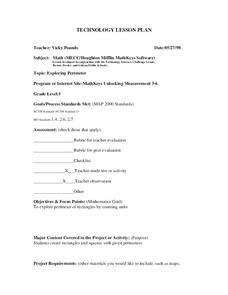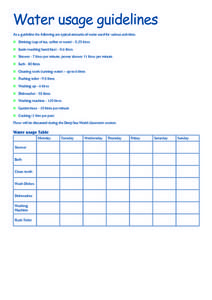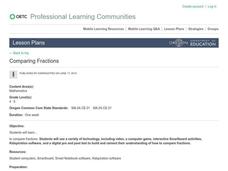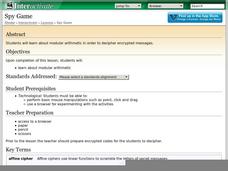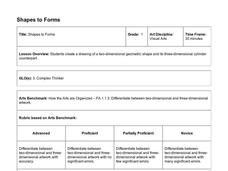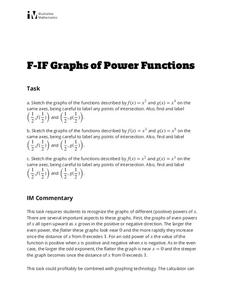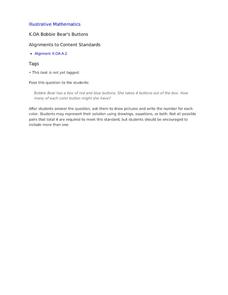Curated OER
Time from Analog and Digital Clocks
Put time into context by relating it to familiar meal times. Scholars examine two analog clocks and one digital clock to determine the times displayed. Each is labeled with a meal time for the hypothetical "Robert." They use their...
Curated OER
Exploring Perimeter
Learners explore perimeter. In this geometry and measurement lesson plan, students create squares and rectangles using given perimeters. Learners construct four sided shapes with given perimeters using the computer program "Math Keys:...
Curated OER
Louisville's Best Field Day Park
Students create a survey to hand out to determine the best field day park. Using their local area, they select five parks, if possible, that meet the criteria and calculate the distance and estimated time travel. They use this...
Curated OER
Number Line Snacks: Compare Numbers to 10
Kindergarteners put Cheerios or cheddar fish on two number lines (up to 10 each) and identify which number the snack pieces indicate. They compare numbers after eating a few of each snack, and get an introduction to addition and...
Curated OER
Water Usage Guidelines
In this environmental awareness and math worksheet, pupils calculate their total water use in a week. Students first read a chart which lists the amount of water (in litres) used for 15 activities. Pupils write the number of litres used...
Organization for Educational Technology & Curriculum
Introduction to Variables and Algebraic Expressions
Begin your next algebra unit with this introductory lesson on variables and algebraic expressions. This plan requires a SMART board and includes a SMART notebook file. The file contains a guiding question and two learning activities that...
Curated OER
Mean and Standard Deviation
Get two activities with one lesson. The first lesson, is appropriate for grades 6-12 and takes about 20 minutes. It introduces the concept of measures of central tendency, primarily the mean, and discusses its uses as well as its...
Curated OER
Backwards Writing: Reflections and Symmetry
Why is "ambulance" written backwards on emergency vehicles? Young geometers apply principles of symmetry to translate words written backwards. See if your school or district subscribes to Jobland, where you can view a clip that explains...
Curated OER
Berlioz the Bear
Young children read the story, Berlioz the Bear and complete various reading and writing activities. They learn about fiction and non-fiction, and complete graphing and writing activities for the story. Youngsters draw the bear and use...
Curated OER
Comparing Fractions
The best way to teach students how to compare fractions is using visual means. This instructional activity suggests a variety of ways to help learners understand this concept using a SMART Board, Kidspiration, videos, computer games, and...
Curated OER
What Are Your Chocolate Eating Habits?
Students design and conduct a survey as an investigation of chocolate eating habits. They pool and analyze their results and consider which companies are making the largest profits based on the information gathered from their surveys.
Shodor Education Foundation
Spy Game
Turn students into detectives as they decipher encrypted messages. Introduce your class to modular arithmetic and have a little fun encrypting and decoding secret messages. The activity does not hit many content standards, but would be...
Curated OER
Try Tessellation
Most middle schoolers probably feel that quilting is at best an activity left to their grandmothers. This lesson uses the Zome modeling system to get them to realize how shapes in quilting are really tessellations and repeating patterns....
Franklin College
Tell Time to the Nearest Half-hour and Relate to Events
Youngsters examine how to tell time to the nearest half-hour. They discuss why people wear watches, listen to the book "What Time Is It?" by Sheila Keenan, view examples on a model clock, and complete a worksheet with the teacher.
Curated OER
Reading & Using a Nutrition Label
Students discover the importance of healthy eating. Using food nutrition labels, they read and examine the nutritional value. Students collect the data on a spreadsheet and create a graph. They analyze the media influences on product...
Curated OER
Graphs and Functions
Use this series of activities to introduce learners to graphing functions. They graph both linear and quadratic equations by hand and with a Graph Sketcher Tool. Several imbedded links and handouts are included in the lesson.
Curated OER
Shapes to Forms
Here is a math lesson that is really a visual arts lesson in disguise! In it, pupils utilize their knowledge of geometric shapes and forms to create a detailed version of a cylinder. The instructions on how to go about the task are very...
Curated OER
Real World Equations!
Help your math class "get the picture" in a quadratic equation lesson that integrates digital photography. Individuals take pictures to help them model the shape of an item or situation using algebraic equations. They discover how to...
Curated OER
Mapping a Site Using a Coordinate Plane
Learners map their playground as if it were an archeological site. They locate objects on the playground and determine their location using coordinate points. A related lesson is Coordinate Grid: Mapping an Archeological Site.
Curated OER
Measuring the Volume of Water Discharge for a Stream or Canal
Students study how to measure and calculate the volume of water flowing down a stream or canal and use simple tools to make measurements. Next, students determine how many people cold live off the volume of water measured. Finally, they...
Curated OER
What is the Average Height of Your Class?
In this statistics lesson plan, learners use an on-line form generator create a class-specific form, then complete the form, view a graph and data analysis, and draw conclusions.
Curated OER
Mosaic Tiles
I would consider this an outline and not a complete lesson. It would take a little work on your part because you would need to look on the internet for examples of Ojibwe art to show your pupils. They could explore the patterns that the...
Illustrative Mathematics
Graphs of Power Functions
This activity consists of three exercises in which learners sketch the graphs of various power functions on the same axes. They use their sketches to make comparisons and observations which lead to generalizations about the graphs of...
Illustrative Mathematics
A Bobbie Bear's Buttons
Young mathematicians help Bobbie Bear pick colored buttons out of a box as they learn how to decompose numbers less than 10 into pairs of smaller numbers. To support young scholars with the process, consider creating a worksheet or...
Other popular searches
- Math Hands on Activities
- Hands on Activities in Math
- Math Hands on Activities
- Math Hands on Area Activities



